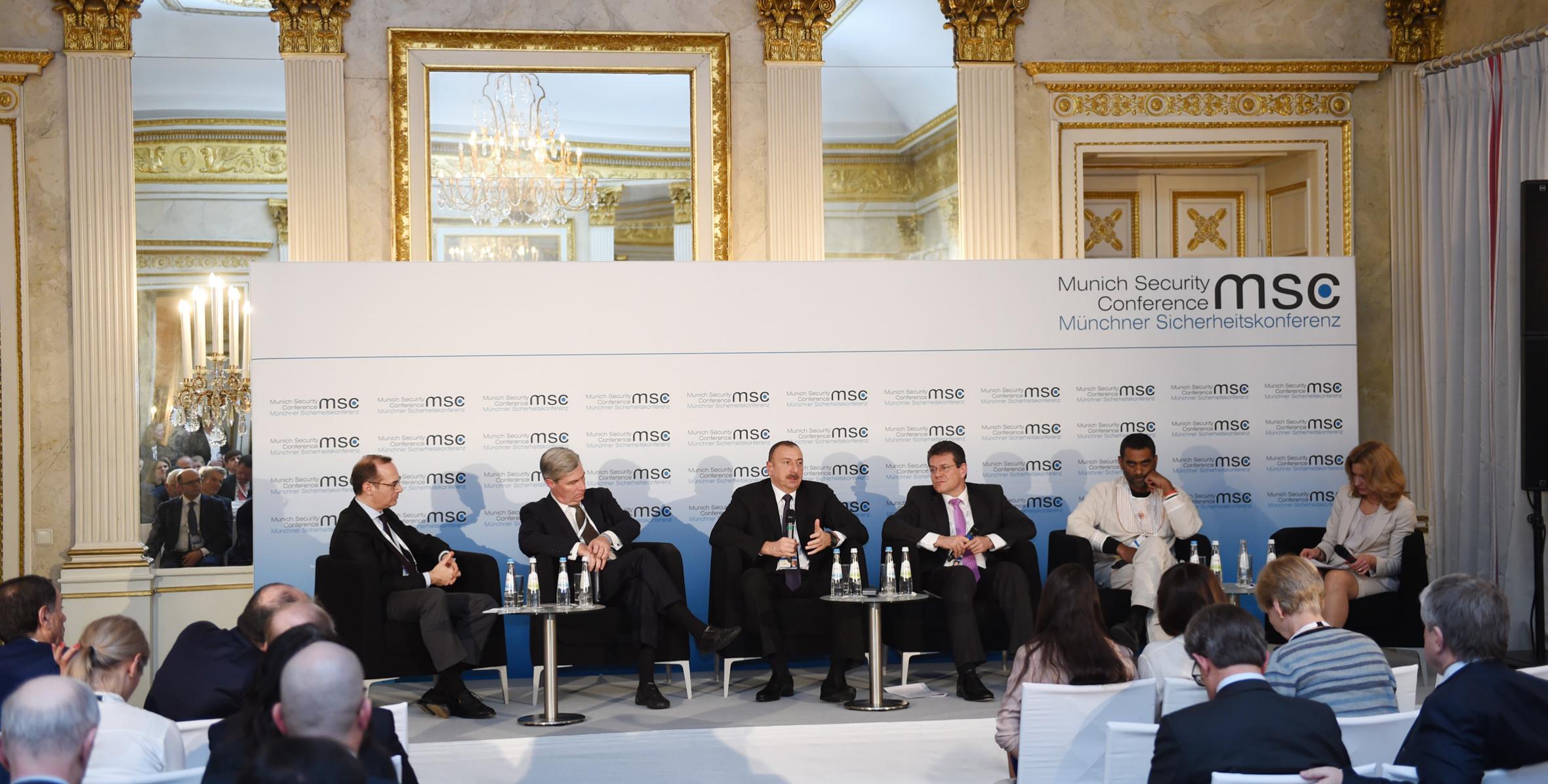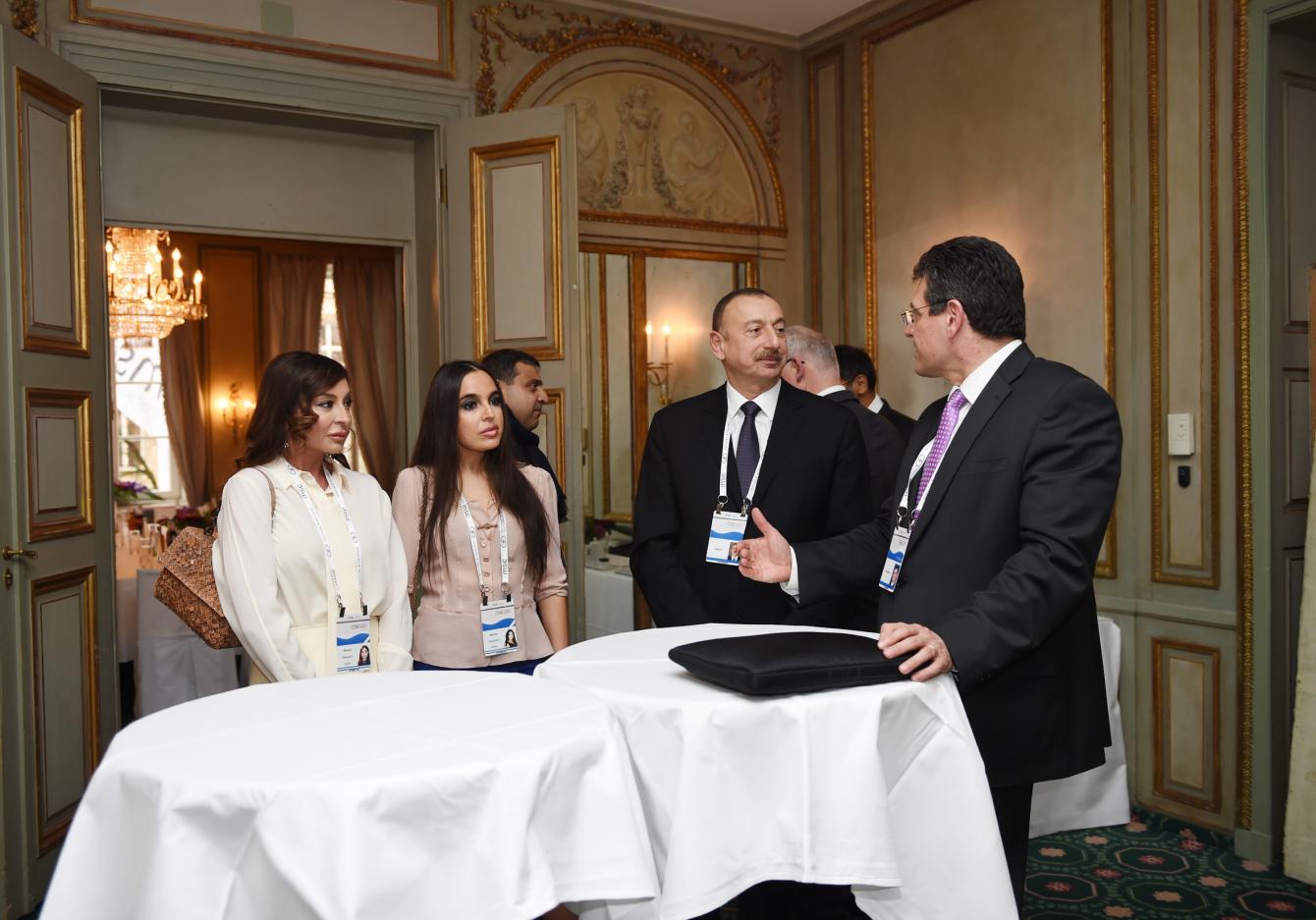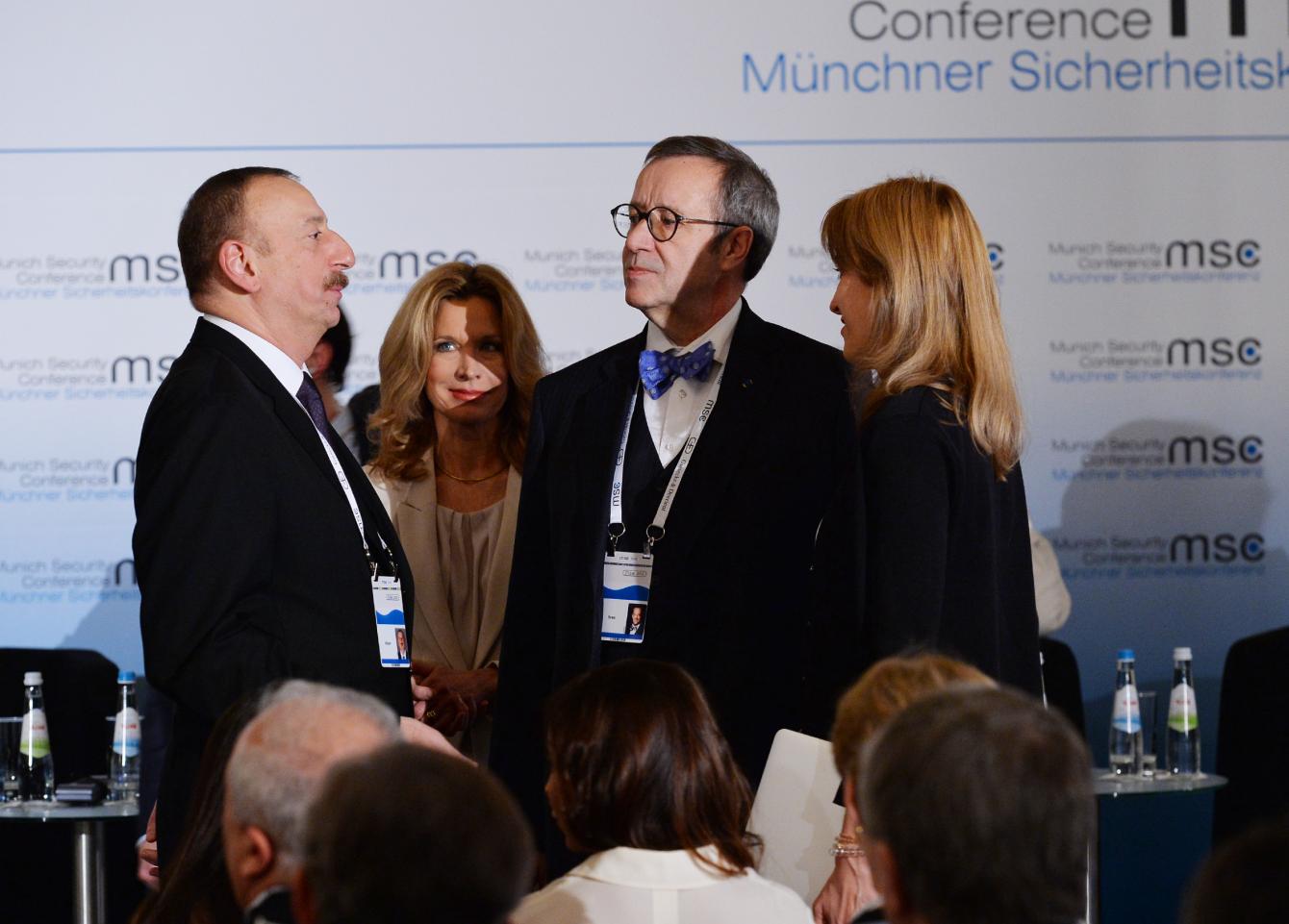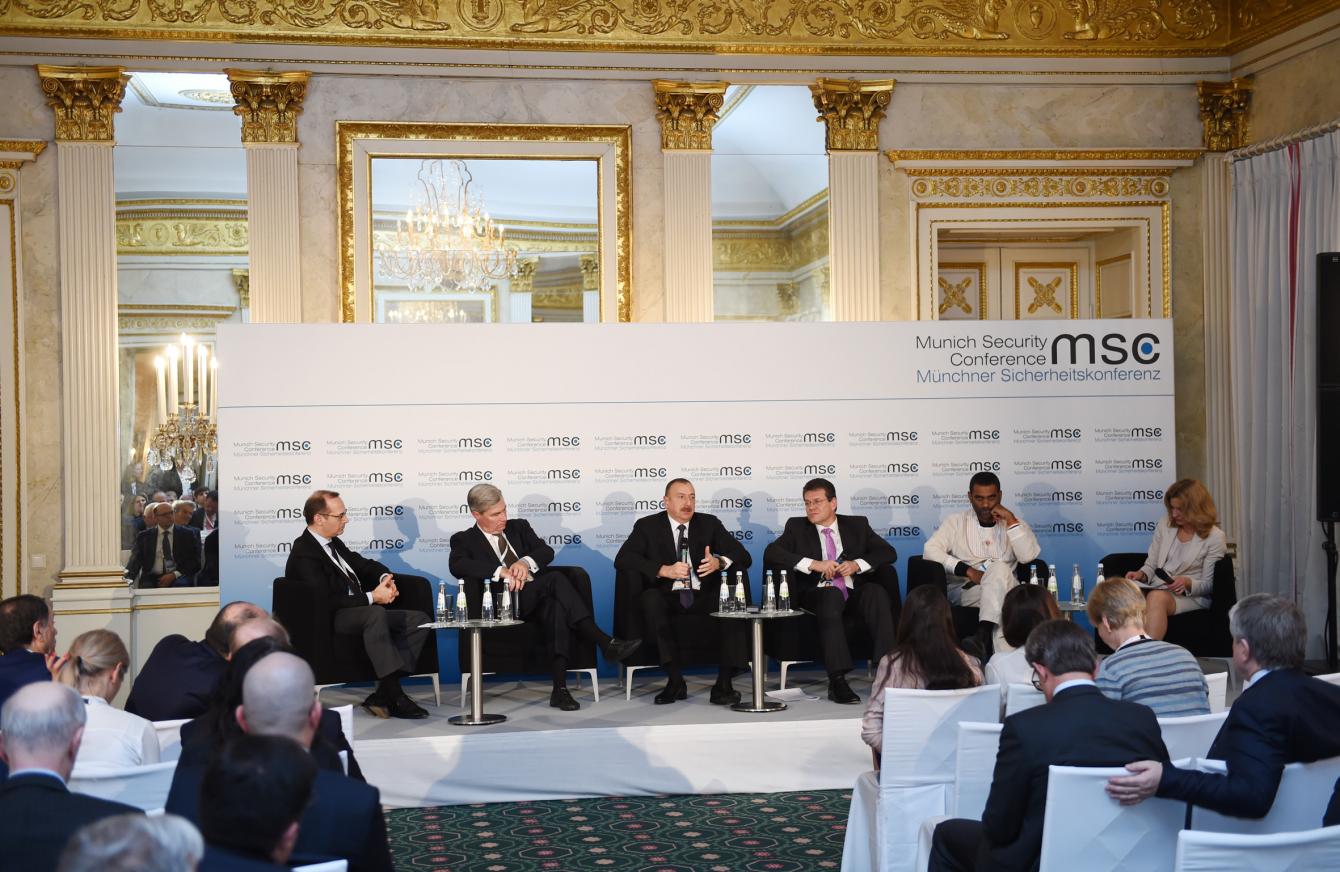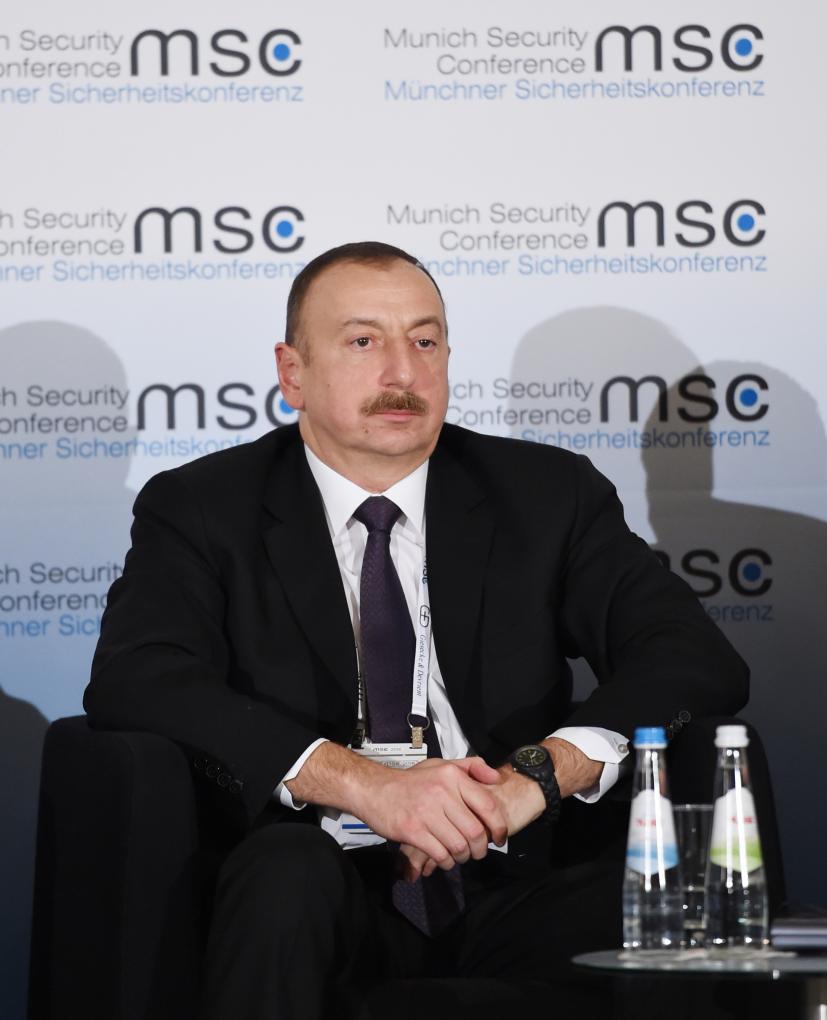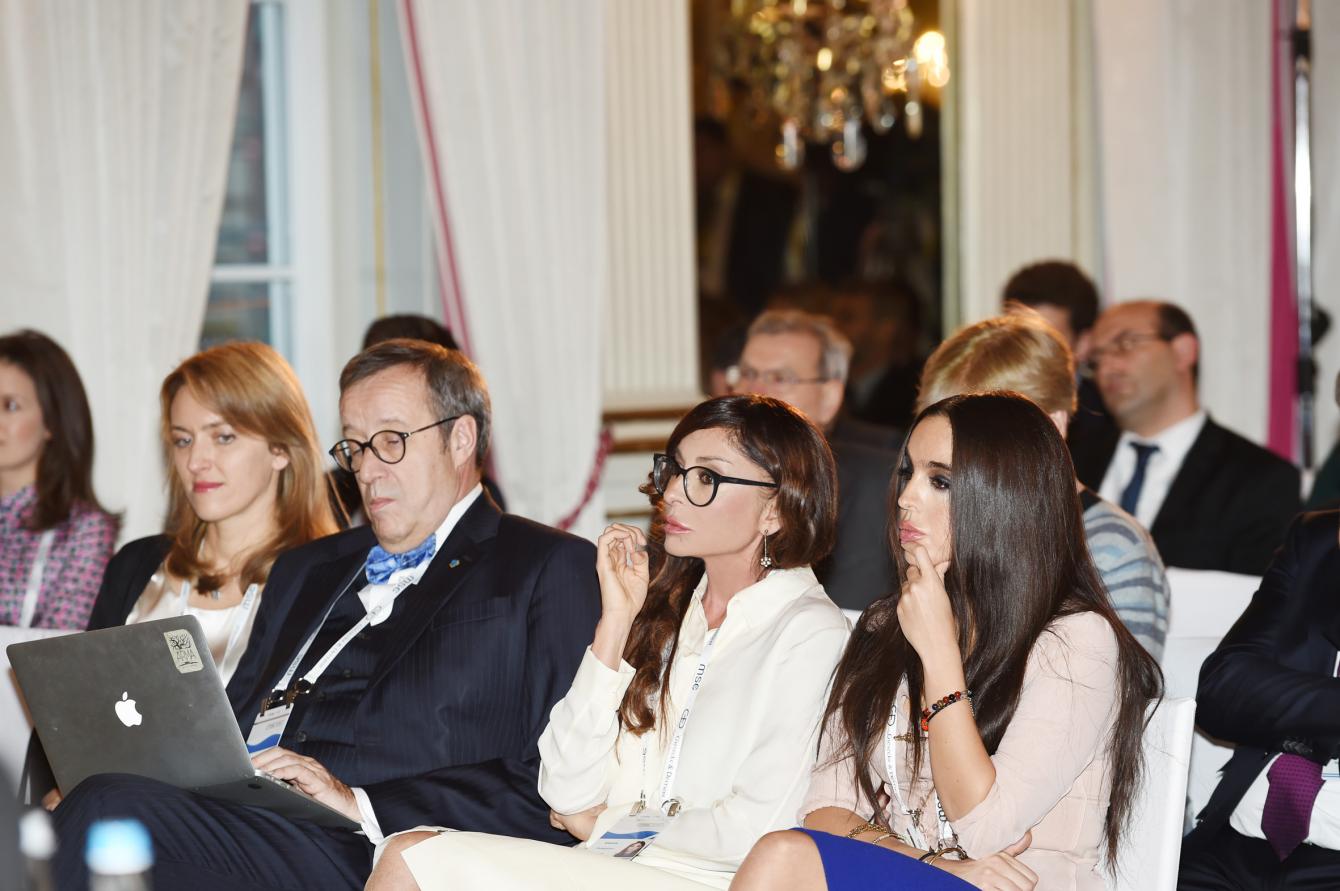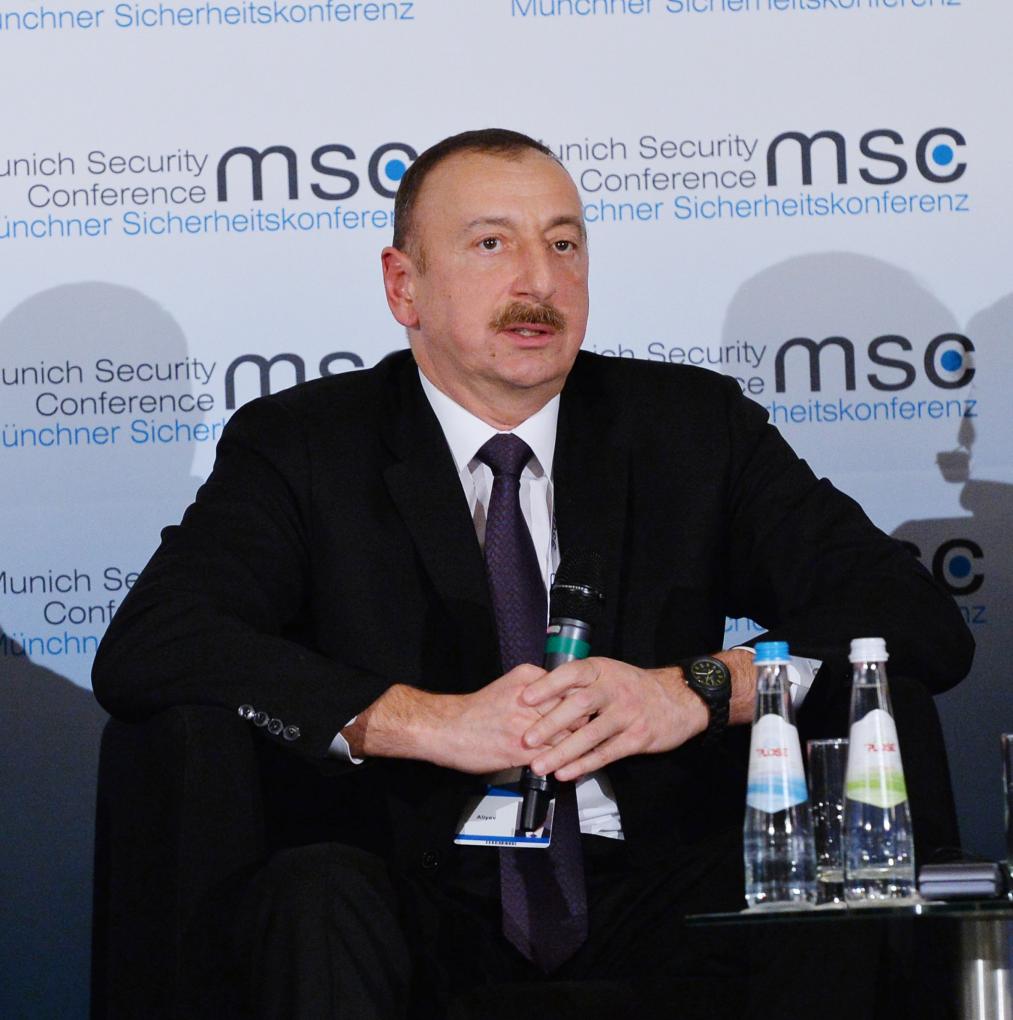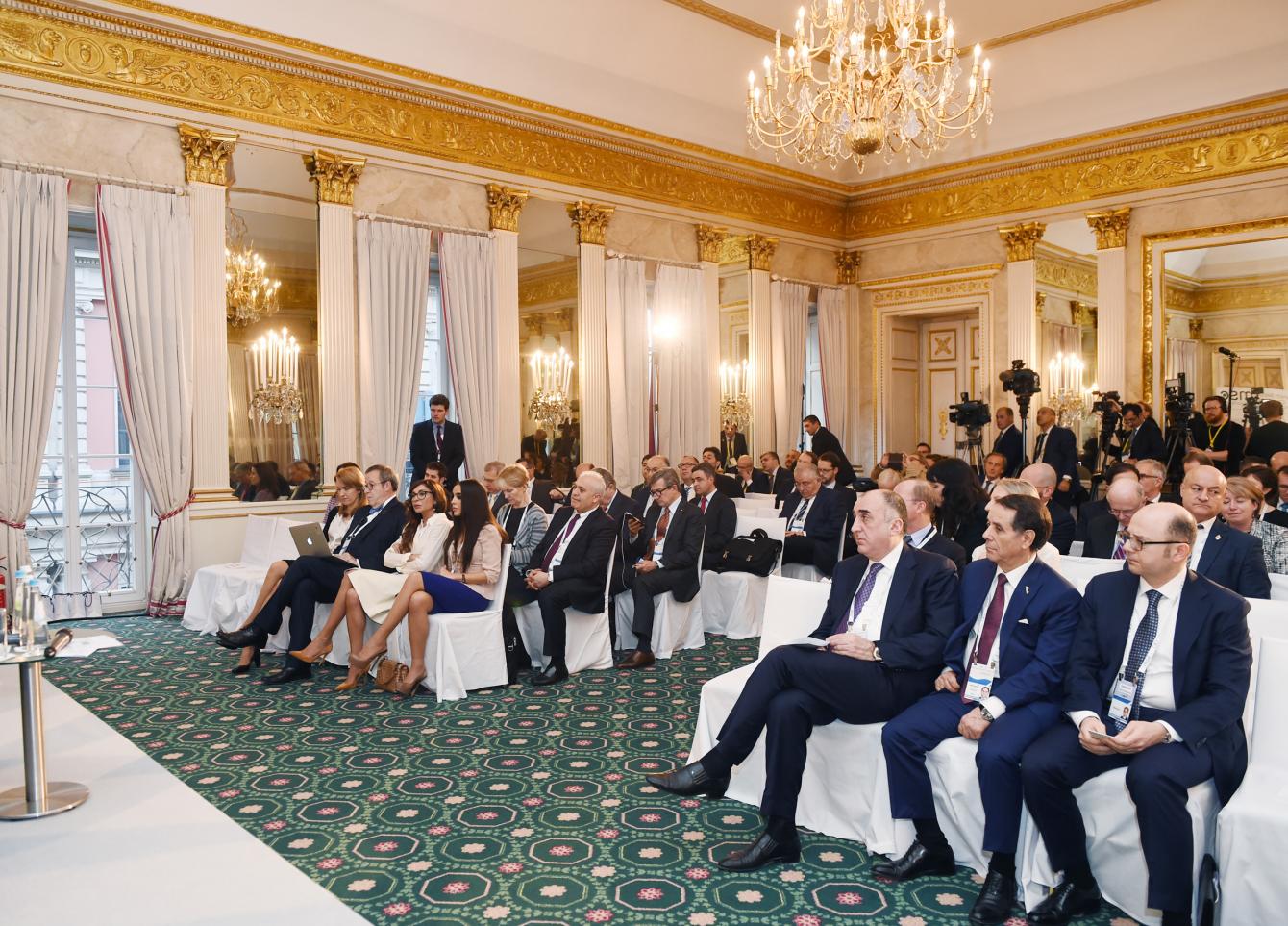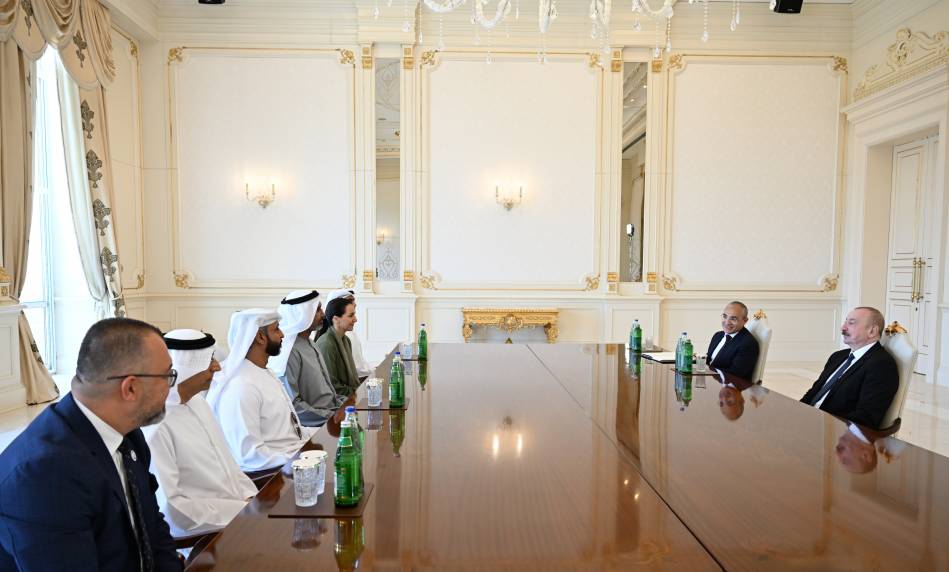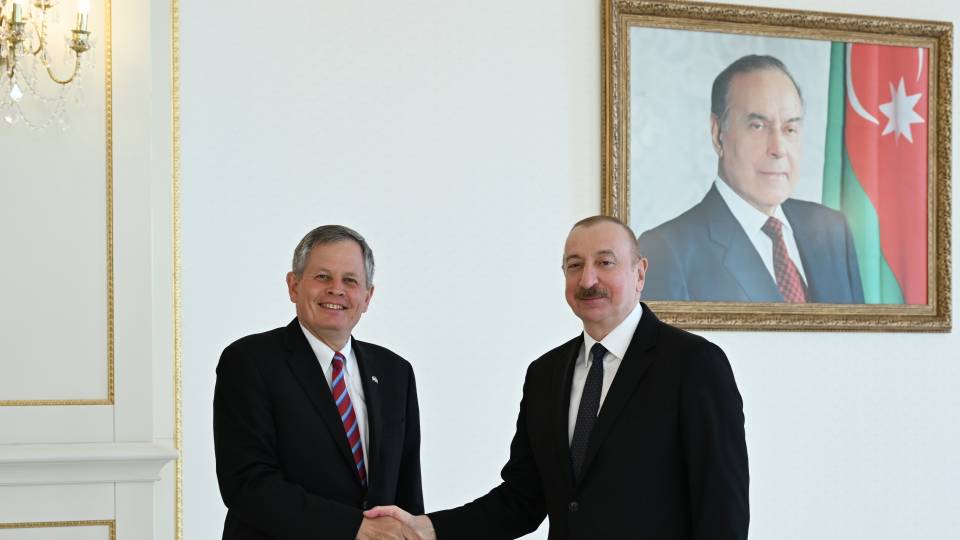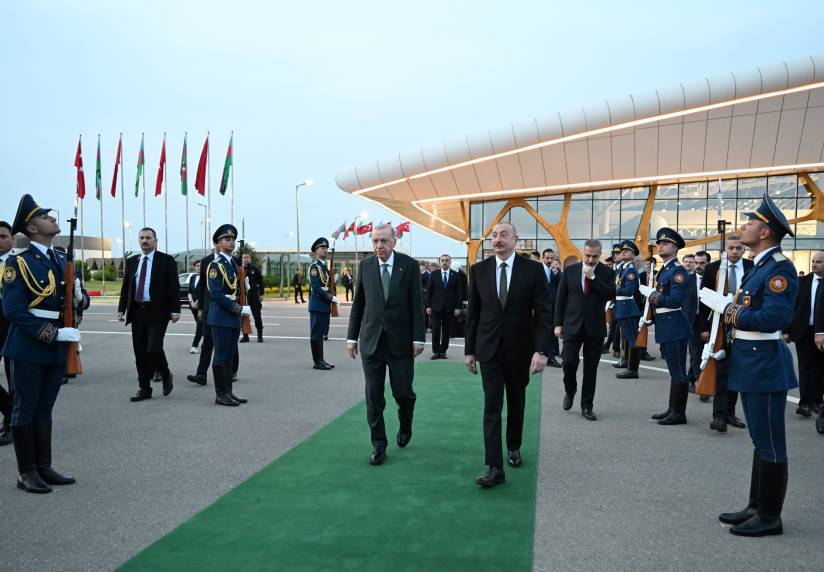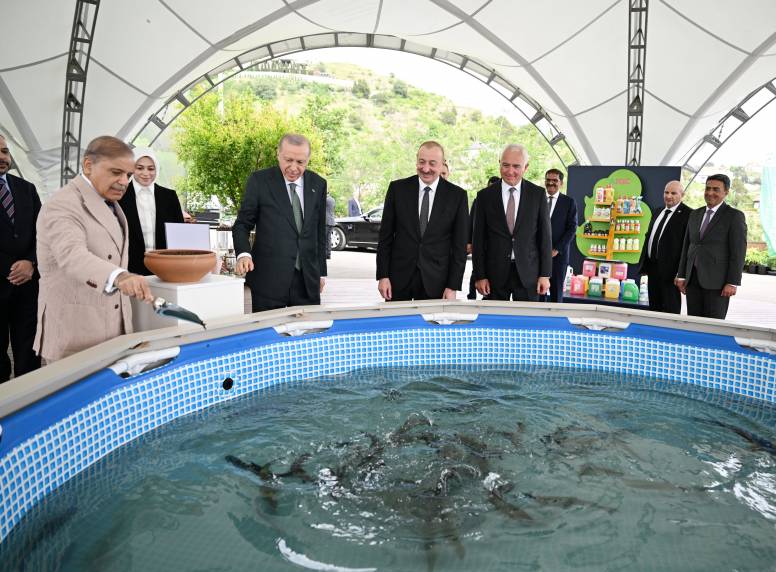President of the Republic of Azerbaijan Ilham Aliyev has attended the Panel Discussion "Climate and Energy Security: Is the Heat Still on?" of the Munich Security Conference.
First lady of Azerbaijan Mehriban Aliyeva and her daughter Leyla Aliyeva also participated in the event.
Moderator Melinda Crane introduced participants of the panel discussion, and then put her question to the President of Azerbaijan.
Moderator Melinda Crane: We are already seeing in Azerbaijan desertification, floods, droughts. You share critical water resources with Armenia, with which you have had a long-running border dispute. Will climate stress exacerbate geopolitical tensions in the Caucasus?
President Ilham Aliyev: Of course, it is a common threat that we all are facing. As far as Azerbaijan is concerned we managed to reduce gas emissions for the last 25 years of independence. In 1990, it was more than 70 million tons, but now it is something more than 50 tons despite the fact that our economy drastically grew during this period of time.
But, of course, there are challenges, there are threats. Particularly for us, of course, the main threat is that our main rivers which supply water to us come from neighboring countries, and there is a very severe pollution, particularly in Armenia, of Araz river, which is a threat to all of us. And despite all our appeals to stop polluting the river, unfortunately, Armenia continues this policy. As you correctly mentioned we are suffering from aggression and occupation for more than twenty years. Almost twenty percent of our territory is under occupation, and apart from sufferings of the people, our nature is suffering because on this territories, which are completely beyond any international control, there is a lot of illegal activity, particularly deforestification because that part is very famous for its ancient trees. But these forests are now being cut for commercial purposes.
We are planting trees. We plant millions of trees every year. We continue policy of gasification and today we use mainly gas and water for power generation. This is our contribution although Azerbaijan does not have any obligations under the Kyoto Protocol. Our commitment is very strong and I think that our performance during the years of independence shows that we are a reliable partner in this process.
Moderator: Just a brief follow-up. Does the prospect of coming water shortages in that very crucial Kur-Araz basin impelling greater cooperation with Armenia on shared management of those resources?
President Ilham Aliyev: Of course, we would like to have more understanding with the country which continues occupation. I can tell you that very recently in January, the Parliamentary Assembly of the Council of Europe adopted a resolution denouncing Armenia for creating problems with water supply to the neighboring regions. In this resolution, which was adopted by the majority of the Parliamentary Assembly, there is an appeal to Armenia to stop actually torturing people who suffer because the water storage which is situated in Nagorno-Karabakh, which was built during the times when Nagorno-Karabakh was part of Azerbaijan de facto, unfortunately they are using it for purposes of creating problems to civilian population.
Of course, Kur-Araz water supplies are critical for us. Though we build a pipeline which is bringing water from our mountains to Baku city and we are now less dependent on the neighborhood. But still, for us it is a serious problem. Though we have a big reservoir like the Caspian Sea and we already started a pilot project of the desalination of the Caspian Sea in order to use it for irrigation and later on for the purpose of drinking water.
Moderator: Your Intended Nationally Determined Contribution under the Paris agreement has listed various measures to modernize the energy sector. But if your country really takes Paris seriously, must it not make a far greater effort to diversify energy that it is already doing? I think energy accounts for 70 percent of your country’s income.
President Ilham Aliyev: We are working on that. But one thing that we must not forget is that when Azerbaijan became independent economy was completely devastated, there was endemic poverty and stagnation. Therefore, for us the only way to find ourselves on the world map was to use our energy resources for the development of the country. Therefore, less than three years after restoration of independence in 1994 we invited major energy companies of the world to come and to invest and that was for the first time when the Caspian Sea was the area of direct involvement of European and American oil companies. For us, then energy security and energy policy was a way to modernize, diversify and invest in infrastructure because the money, which we accumulated from oil sales, were kept in the sovereign wealth fund and at the same time were invested in infrastructure to reduce dependence on oil.
And as a result of that policy of diversification today non-oil sector accounts for more than 70 percent of our GDP. Of course, we depend on oil prices with respect to our export. Oil and gas account for 90 percent of our total export.
We are now implementing large-scale reforms including privatization, diversification of economy, improvement of business climate in order to reduce the dependence on oil and gas. And, by the way, the drastic drop of the oil prices, four times, for us was another opportunity to invest more in technology, non-oil economy, agriculture, ICT. If we succeed in all our plans I am sure that in the coming years Azerbaijan will be completely independent from oil prices.
As I said recently post-oil period of Azerbaijan already started because of the low oil price. We must find our way on the global market as a country which exports not only oil and gas, but other products.
Moderator: But interestingly enough your Intended Nationally Determined Contribution, in fact, mentioned falling oil prices as a major potential constraint that would impede your ability to fulfil your goals.
President Ilham Aliyev: Well, of course it would influence our income. But at the same time, I think, it will make us more committed to reforms and the future development of Azerbaijan will not be related to the price of oil or volumes of production. Though today we are implementing the Southern Gas Corridor project which will generate additional thousands or tens of thousands of jobs and which will allow Europe to diversify. By the way Europe will get additional volumes of natural gas and thus also reduce greenhouse gas emissions. This is a project of energy security diversification of not only routes, but also sources. It is a project which will bring benefits to us, producers, transit and consumer countries.
Moderator: A lot of money is flowing into adaptation to help countries like Azerbaijan. I think your country estimated the cost of adaptation as at least three billion euros, if not much more. Do you receive necessary help?
President Ilham Aliyev: Actually, Azerbaijan’s policy, in general, is that we must spend less than we earn. The major investment projects including investment in energy were mainly based on our own financial resources and resources of our partners. Therefore, we do not expect any kind of substantial financial assistance.
During the recent time Azerbaijan has accumulated substantial financial resources and even the drastic drop of oil did not influence our economic development. Last year we had more than one percent growth of GDP and more than eight percent growth in non-oil industry that was mainly due to the policy of diversification and investments in non-oil infrastructure. Therefore, for us, of course, general situation in the region is important. Sustainable development is our goal. With respect to the climate change, as I mentioned in the beginning of May, though we don’t have obligations under the Kyoto protocol, our economic policy, investments in renewable sources of energy, the building of more than ten hydro power stations – all that is our contribution.
If we did not invest together with our partners in oil and gas, today our power stations would have been used as during the Soviet times burning oil. Today all our power stations are either using natural gas or water. So this is investments in energy sector which, in its turn, positively influences the reduction of carbon gas emissions. All these issues are inter-connected. Of course, we will continue to play our important role in managing these risks.
X X X
Representative of the Ministry of Foreign Affairs of Armenia: I am from the Ministry of Foreign Affairs of Armenia and my question goes to President Aliyev. Mr. President, you blamed Armenia for polluting water and other serious political things on which we in Armenia have very different opposite views. How would you explain that for everything bad happening in Azerbaijan, Azerbaijan blames Armenia? For example, when the international community criticizes Azerbaijan for human rights record, Azerbaijan blames Armenia. When the Parliamentary Assembly of Council of Europe and European Parliament adopt critical resolutions on Azerbaijan, again Azerbaijan criticizes Armenia and Armenian lobby. And even when oil production was reduced in Azerbaijan, British Petroleum was criticized for conspiring with Armenia. Mr. President, is it easier to have one universal answer to all difficult questions?
President Ilham Aliyev: First of all, I’d like to say that the ideas which you introduced in your question are absolutely wrong. We do not blame Armenia for those reasons which you mentioned. First of all, not only Azerbaijan, but Armenia is criticized by the Council of Europe, European Parliament for very severe violations of human rights, falsification of presidential and parliamentary elections, and many other things which your government committed.
We are blaming Armenia for occupation. And not only us. Security Council of the United Nations, the highest international body, adopted four resolutions demanding immediate and unconditional withdrawal of Armenian forces from occupied territories. We are blaming the Armenian government, not Armenian people, for genocide in Khojaly where innocent civilians were killed by Armenian gangs only because they are Azerbaijanis. This genocide is recognized by more than ten countries. We are blaming Armenia for sufferings of million refugees and IDPs who became refugees on their own land. 40,000 thousand from Nagorno-Karabakh, 750,000 from other occupied territories of Azerbaijan, and 200,000 Azerbaijanis who were expelled and ethnically cleansed from Armenia. These are all results of your occupation. This is result of your policy towards a neighboring country. Occupation must be stopped. In order to achieve peace in the region first condition is to stop occupation of Azerbaijani lands.
Moderator: There are some who believe that working on concrete cooperation in the area of water could be confidence building and a step towards a greater cooperation on some those other issues. Do you think that’s right?
President Ilham Aliyev: Well, of course, the resolution which was adopted less than a month ago in Strasburg by the Parliamentary Assembly of the Council of Europe actually points out the very important element in this issue and particularly puts responsibility on Armenia for the problems they create with respect to the management of water resources. Therefore, in order to establish cooperation between Armenia and Azerbaijan the process of de-occupation must start. The best confidence building measures will be to stop occupation because not only Nagorno-Karabakh, which is a historical part of Azerbaijan, but seven districts surrounding Nagorno-Karabakh are completely destroyed. Occupation lasts for more than twenty years. Armenia wants to keep the status quo unchanged. We want to change the status quo. So the first step must be the beginning of de-occupation of the territories, and then we will start cooperation.

